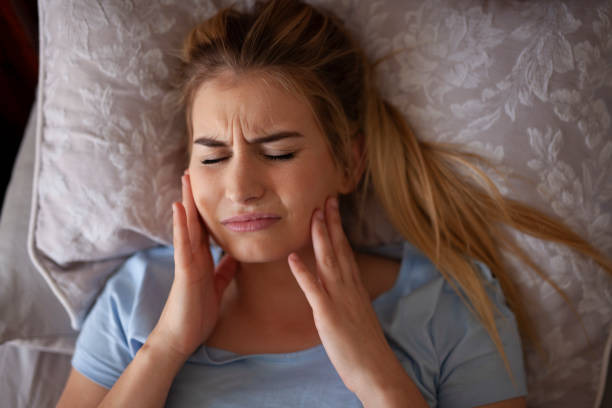Teeth Grinding, Bruxism or Temporomandibular Joint Disorder (TMJ) is associated with the condition where someone continuously grinds the teeth or clenches the jaw while sleeping. It can cause serious damage to the mouth and is linked to future jaw joint disorders. It is primarily caused due to stress and even misaligned teeth structure. If left unattended, it can lead to persistent pain and other inflammatory diseases.
The principal problem with teeth grinding is that it takes place at night while you are sleeping and unaware of your bodily movements. Hence, oftentimes teeth grinding remains undiagnosed and only detected when the situation has aggravated.
We, at Airdrie Springs Dental Clinic, have identified a couple of symptoms that can help you determine TMJ in Airdrie.
Chronic headaches in the Morning
Do you suffer from headaches every morning after you wake up? It might be a sign of teeth grinding. When you grind your ivories or tighten your jaw at night excessive pressure is created on your jawbones. These jawbones are connected to your skull. Hence, your head throbs from all that applied pressure the entire night. Observe if your headaches occur specifically at dawn. If it does then visit a dentist immediately.

Severe Jaw Joint Disorders
Continuous teeth grinding can lead to serious issues for jaw joints. The structure of your jawbones might change drastically and extensively harm your joints. If you find your jaw locking or making strange clicking sounds throughout the day then you are most likely suffering from bruxism. Sore jaw and tightened jaw muscles are the most common symptoms of bruxism.
Rush to the dentist if you experience these symptoms and get a thorough checkup. Untreated TMJ can lead to perennial pain and limited movement of your jaw.
Sudden Sensitive Teeth
Teeth sensitivity is experienced by almost everyone and most people do not pay any attention to it. It is one of the common oral issues that can damage your teeth. However, hypersensitivity could be a symptom of teeth grinding. Night-time grinding creates constant friction which ultimately erodes our enamel. Corroded enamel exposes the underlying dentin and makes our teeth extremely sensitive to hot or cold temperatures. Continuous exposure to dentin could lead to weakened teeth and ultimately result in tooth loss.
Your special toothpaste aimed to treat this condition might not work at all. Resorting to dental care is of utmost importance in these cases if you want to protect your teeth.
Uncomfortable Sensation in the Ear
Uncomfortable cramps in the ear can be a result of constant teeth grinding. The jaw muscles spread up to your ears as well as your forehead. Hence, similar to your jaws, your ears might also feel sore. Your ears might make a popping sound right after you wake up and cause you trouble all day. Seeking dental emergency help might help you to detect the root cause of the problem and relieve you from further stress.
Worn-out Teeth Surface
The most common symptom is marks of wear and tear on your teeth. Bruxism can flatten the curves and grooves of your teeth and even lead to chipped teeth. This is the most obvious giveaway of nocturnal bruxism. If your notice that your teeth appear to look like this then you must visit the Airdrie dental clinic.
Consult with the dentist and choose remedies that can help you to stop teeth grinding.
We hope this blog has given you the insight you required to detect teeth grinding. If you are looking for the best dentist in Airdrie, AB then visit us and choose our TMJ therapy in Airdrie.

